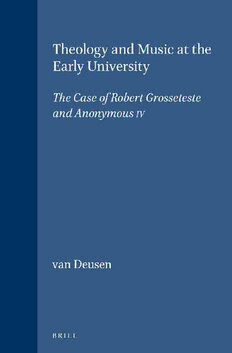
Theology and Music at the Early University: The Case of Robert Grosseteste and Anonymous IV PDF
Preview Theology and Music at the Early University: The Case of Robert Grosseteste and Anonymous IV
BRILL'S STUDIES IN INTELLECTUAL HISTORY General Editor A.J. VANDERJAGT, University of Groningen Editonal Board M. COLISH, Oberlin College J.I. ISRAEL, University College, London J.D. NORTH, University of Groningen H.A. OBERMAN, University of Arizona, Tucson R.H. POPKIN, Washington University, St. Louis-UCLA VOLUME 57 *4 THEOLOGY AND MUSIC AT THE EARLY UNIVERSITY The Case of Robert Grosseteste and Anonymous IV BY NANCY VAN DEUSEN lo • S E.J. BRILL LEIDEN · NEW YORK · KÖLN 1995 The paper in this book meets the guidelines for permanence and durability of the Committee on Production Guidelines for Book Longevity of the Council on Library Resources. Library of Congress Cataloging-in-Publication Data 94-34149 CIP Die Deutsche Bibliothek - CIP-Einheitsaufhahme Deusen, Nancy van: Theology and music at the early university : the case of Robert Grosseteste and Anonymous IV / by Nancy van Deusen. - Leiden ; New York ; Köln : Brill, 1994 (Brill's studies in intellectual history ; Vol. 57) ISBN 90-04-10059-8 NE: GT ISSN 0920-8607 ISBN 90 04 10059 8 © Copynght 1995 by E.J. Brill, Leiden, The Netherhnds All rights reserved. No part of this publication may be reproduced, translated, stored in a retrieval system, or transmitted in any form or by any means, electronic, mechanical, photocopying, recording or otherwise, without prior written permission from the publisher. Authorization to photocopy items for internal or personal use is granted by E.J. Brill provided that the appropriate fees are paid directly to The Copyright Clearance Center, 222 Rosewood Drive, Suite 910 Danvers MA 01923, USA. Fees are subject to change. PRINTED IN THE NETHERLANDS CONTENTS Acknowledgments vii Introduction ix I. Thirteenth-Century Motion Theories and Their Musical Applications: Robert Grosseteste and Anonymous IV 1 II. Ubi Lex! Robert Grosseteste's Discussion of Law, Letter, and Time and its Musical Exemplification 19 .ΙΠ Ductus, Tractus, Conductus: The Intellectual Context of a Musical Genre 37 IV. Change in a Concept of "Mode" 54 V. Grosseteste's Concept of Figura and its Application to Music Notation 76 VI. Operatio: Towards a Theory of Performance in Thirteenth- Century Intellectual Culture 99 Vu. Composite Harmony: An Aspect of the Conceptual Background to the Problem 113 VIE. A Theory of Composition and its Influence 127 IX. Opus: A Conception of the Musical Work 146 X. Firmamentum and Motet: A Theological Basis for a Musical Genre 161 XL Planus, cantus planus: The Theological Background of a Significant Concept 177 .ΠΧ The Musical Exemplification of Quadrivial Pursuits: The Intellectual Relationship between Robert Grosseteste and "Anonymous IV" 188 .ΠΙΧ Conclusions 205 Abbreviations of Works Cited 211 Bibliography 212 Index 219 ACKNOWLEDGMENTS This book was begun during a study period in a most conducive atmosphere. I had been invited as a research fellow by the University of New England, Armidale, New South Wales, Australia. Each week I gave a seminar, and, since it was Friday, we—students, post-doctoral fellows, and faculty— discussed the topic I had presented all afternoon. Most of the other faculty members were specialists in ethnomusicology, and I began to be more keenly aware, especially in conversation with the Australian aboriginal music specialist, Professor Catherine J. Ellis, of the format of basic principles. I am especially thankful to her for her penetrating questions, her patience in discussion, her own intellectual development within her field. She articulated to me the gaping expanse separating a "Western" sense of logical progression, often unconsciously accepted, and what she had encountered during years of sensitive, creatively open study of the music and spiritual culture of Australian aboriginal musicians. One day she asked me, what do you really think a paradox is? It was through time, questioning, and dialogue with Cath Ellis that I realized that basic analytical tools that helped me daily in my work, and which I took for granted, were identified, discussed, expounded, tested, and incorporated into the routine of intellectual activity during the early thirteenth century. This book concerns these tools. The individual chapters were given as papers throughout the world, at Symposia for the International Musicological Society in Melbourne, and Osaka, and at its meeting in Madrid, 1991; at the universities of British Columbia, California (Berkeley, Davis, Los Angeles, Riverside), Dayton, Iowa, Michigan, New Mexico, Southern California, Stanford, Toronto, and Western Michigan, at California State University, Northridge, and The Claremont Graduate School, at annual meetings of the American Musicological Society, the Medieval Academy of America, the Medieval Association of the Pacific, the Medieval Institute of Western Michigan University, the Society for Ethnomusicology, and the Cantus planus meeting in Eger, Hungary, 1993. The ideas contained in this book have been exposed to many and diverse, albeit extremely knowledgeable, audiences, and I am grateful for all of the comments and reflections from the scholarly community that have, in many cases, shaped and refined details of my arguments. Finally, I wish to thank Marcia L. Colish, Richard C. Dales, Joseph Goering, Edward Grant, Don Harrân, Sabine MacCormack, Thomas F. X. Noble, and the editors of, as well as the readers selected by Brill Press, for careful reading of my manuscript, in some cases, and, in all, for helpful vin ACKNOWLEDGMENTS discussion of the concepts and formulations contained therein; Petra Meyer- Frazer for her editorial assistance and R. Chris Berry for help in the production of this book. Nancy van Deusen, Los Angeles, 1993
